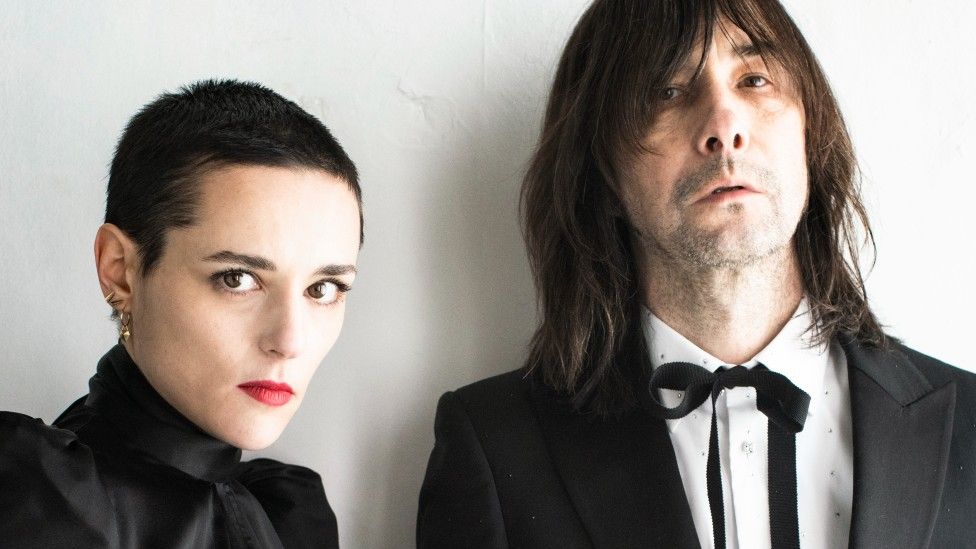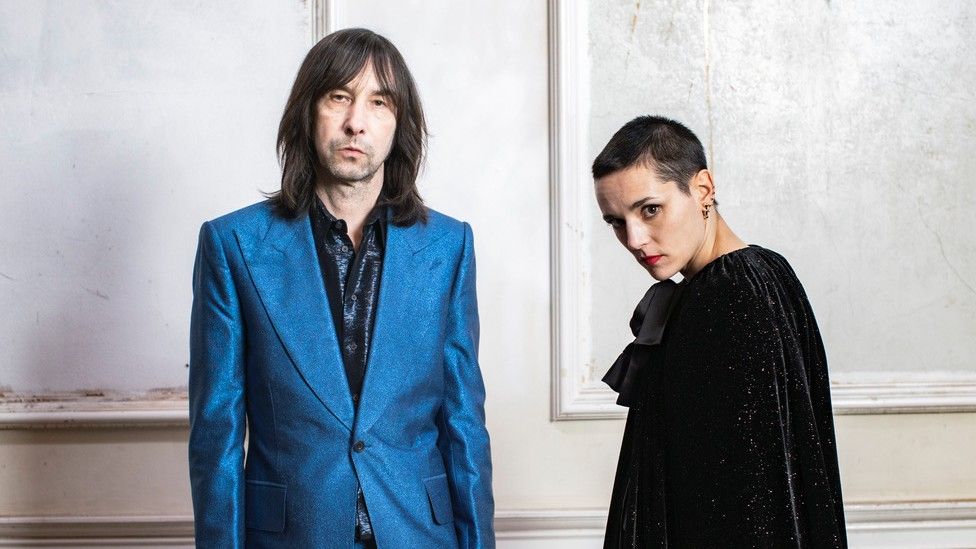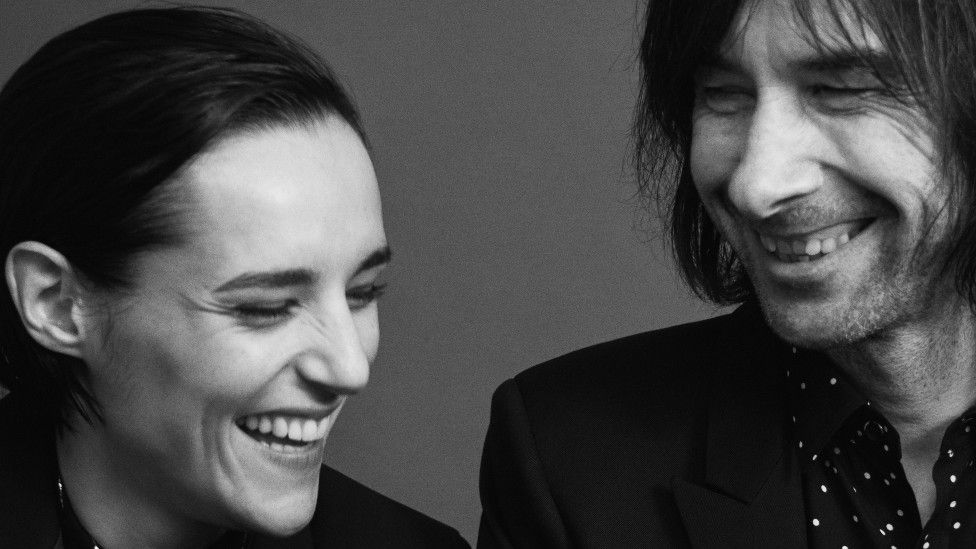Bobby Gillespie and Jehnny Beth: ‘Brexit has destroyed any hope for young musicians’on July 2, 2021 at 9:21 am
Bobby Gillespie and Jehnny Beth on culture wars, and why Utopian Ashes is not a break-up record.

image copyrightSam Christmas
In 2018, then-BBC politics presenter Andrew Neil ended one of his This Week programmes by getting guests Michael Portillo and MP Caroline Flint to join him for a performance of the latest online dance craze, Skibidi.
As the bizarre scene unfolded, the show’s other guest, Bobby Gillespie, remained rooted to his seat wearing an obdurate and slightly weary expression.
The Primal Scream frontman, whose band helped to merge club culture with rock ‘n’ roll sensibilities in the early 90s, felt he had earlier been cut off by the host while debating the impact of Brexit, neo-liberal capitalism, and the rise of far-right politics globally, and was now in no mood for such frivolity.
The clip soon trended online, with many people feeling his discomfort. Neil later labelled him “a miserable Jock”.
“I was kind of this lamb to the slaughter,” recalls Gillespie, who was also joined on the show by former Labour spin doctor Alastair Campbell.
“I was like this innocent guy – as a left winger, who is a musician, a rock ‘n’ roller – and suddenly I’m in this programme that’s going out live.
“These are hardcore political people, career politicians. I didn’t even know Andrew Neil’s history.”
He adds: “I don’t watch TV, so I had no idea who he was, believe it or not, although I’m interested in politics.
“But it kind of worked out well in a way that I was that innocent.”
Gillespie, whose dad Bob was a union rep at the time of The Wapping Dispute when Neil was editor of The Sunday Times, has always incorporated the politics of resistance into his music.
His latest project, Utopian Ashes, sees the Glaswegian join forces with French singer Jehnny Beth for a country-soul style and pain-drenched concept album about a married couple at breaking point, trying to cling on in spite of themselves.
Beth, who broke through as the roaring frontwoman of London art-punk act Savages, moved back to France shortly before (but not because) Brexit happened, after having lived in the UK for more than a decade.
The new duo are well placed to discuss what life is like for artists on either side of the Channel right now.
“I think the Brexit thing, it’s destroyed any hopes of chances for young musicians that are trying to make it,” Gillespie tells the BBC.
“I think Brexit is completely destructive to creative arts. But what do you expect?”

image copyrightSam Christmas
The Scot stresses how artists today do not have the same opportunities that working class British kids like himself, Jarvis Cocker, Ray Davies, Keith Richards, Brian Eno and Bryan Ferry, were once afforded.
This is due, he opines, to the ending of free further education in large parts of the UK, squatters’ rights and certain benefits by a succession of Tory and Labour governments, as well as the new plan to cut university funding for creative subjects by almost 50%.
He’s hopeful people will “fight” to win back some of those rights.
“The only way they [young artists] can survive is to stay at home with their parents or take zero-hours jobs,” he says.
“People will still be creative, because young people have these creative ideas, and they will express their generation’s hopes, fears, desires, lusts and original ideas – and no government is going to stop that.
“But they’ve made it harder.”
Gillespie feels the UK is “sleepwalking into disaster” and that a “culture war narrative” has been created to serve as “a huge distraction”. Beth, meanwhile, believes there is “a tradition here [in France] of the government helping artists that doesn’t exist in the UK, for sure”.
She notes how she would not have been able to make their new album if she “hadn’t been able to freely go there [to the UK] without paying anything, and become an artist in London”.
“I’m a great defender of the arts and I think the way the UK is veering, it’s just scary to be honest,” says the vocalist.
In response, a government spokeswoman told the BBC: “We want performers and other creative professionals to be able to tour easily abroad.”
She said short-term visits were still possible without work visas for performers in at least 17 countries including France, Germany and the Netherlands, but the government recognised “the difficulties still being faced by the sector” and was “working closely with individual member states to encourage them to adopt a more flexible approach”.
She also pointed to the government’s announcement last week of the release of a final £300m from the coronavirus Cultural Recovery Fund to support selected arts bodies. Not everybody that asked for help has received funding, however, and many out-of-work musicians and crews have fallen through the cracks of the furlough scheme, which has now started to wind down.
Gillespie and Beth’s comments come in the same week that Sir Elton John accused the government of failing to understand the implications of Brexit on music. He joined other stars including Bruce Dickinson of Iron Maiden, who voted for Brexit, and the likes of Radiohead, who have urged Downing Street to make touring Europe easier to prevent “the collapse of the industry”.
Brexit minister Lord Frost said on Tuesday that the likes of Sir Elton should help the government persuade European Union countries to relax their rules on letting British musicians tour, noting how the star “had his first hits before the UK even became a member of the European Union”.

image copyrightSam Christmas
New cross-Channel collaborators, Gillespie and Beth, first met before the EU referendum, when in 2015 they were both invited to perform together alongside US duo Suicide at the Barbican. Beth was taken aback by Gillespie’s “power as a performer” that night.
The following summer they were re-united on-stage for a joint rendition of Nancy Sinatra and Lee Hazlewood’s Some Velvet Morning, with Beth taking on the role once performed by supermodel Kate Moss on Primal Scream’s cover of the track.
After the pair swapped lyrics and melodies, Gillespie and his band – including Andrew Innes, Martin Duffy and Darrin Mooney – then headed to Paris in 2017 for some writing sessions with Beth and her partner Johnny Hostile.
She found Gillespie’s “enthusiasm for sharing ideas” to be “contagious”, she remembers, and was moved by him sharing his “vulnerable side”. Gillespie, in turn, says he was amazed by Beth’s “creative generosity”, joking she gave him more feedback on his verses than some of his bandmates have done in more than 35 years together.
“In Primal Scream, I don’t have that relationship with anybody” says the former Jesus and Mary Chain drummer.
“I’d sometimes ask [guitarist] Andrew Innes, over the years, ‘What do you think of this line?’ And he would just ignore me. [He would] look on the computer and pretend he was looking at the BBC website at the news.
“I would scream at him, ‘Give me your opinion!'”
As the months rolled by, what had begun as a bag of largely electronic and disparate musical ideas morphed into a beautifully orchestrated guitar-driven concept album. Recorded in under a week in 2018, the LP is full of blues-stained sonnets, heart-rending harmonies and spoken word late night confessions.
Tracks like lead singles Remember We Were Lovers, Chase It Down, and album centrepiece You Can Trust Me Now show the pair following, and updating, the traditions of lovelorn male/female singing counterparts, like Gram Parsons and Emmylou Harris, and George Jones and Tammy Wynette.
“Show me if you really want this love,” begs Beth on the album opener, setting the tone.
“Desire is a hunger that murders the heart,” warns Gillespie on Stones Of Silence, bearing witness to the perils of the pleasures of the flesh.
“It’s a story of two people who are living together, but alone and apart,” he explains. “The crux of the record is emotional inarticulacy.
“It’s not a break-up album,” underlines the 59-year-old, who has two teenage boys with his wife, the fashion stylist Katy England. “None of that teenage [rubbish]!”
“I wanted to write a record about adults,” he goes on. “People who have something precious to lose, like a young family.
“People who have emotionally, financially, even career-wise, committed to this thing greater than both of them, which is the utopian idea of a family.”
Gillespie’s rock ‘n’ roll family, Primal Scream, have lost plenty of gigs over the past year or so due to the pandemic, but last week they made their live return headlining Bigfoot – one of the first UK music festivals of the Covid era.
Unlike on Andrew Neil’s show, the frontman will be delighted to dance and sing at Standon Calling later this month too, as music events slowly return.
Their new French associate will join them for a run of Utopian Ashes-focused gigs in November, including at the new Pitchfork Festival in London, and in Manchester Cathedral.
In the meantime, Gillespie is still “putting the finishing touches” to his upcoming memoir, Tenement Kid. Beth, who herself has had a book of erotic short stories published, will finally get around to recording new episodes of her French TV music show Echoes.
The goal, the 36-year-old singer, presenter, and actress says, is to simply “have fun” and “bring musicians together”.
“I think that’s something that we can learn from the black community, in the music or the arts in general,” says Beth. “How to get together and discuss, and I think we need to do it better in our end, and be very inclusive.
“We’re more powerful together as well, facing the industry.”
Utopian Ashes by Bobby Gillespie and Jehnny Beth is out now.
